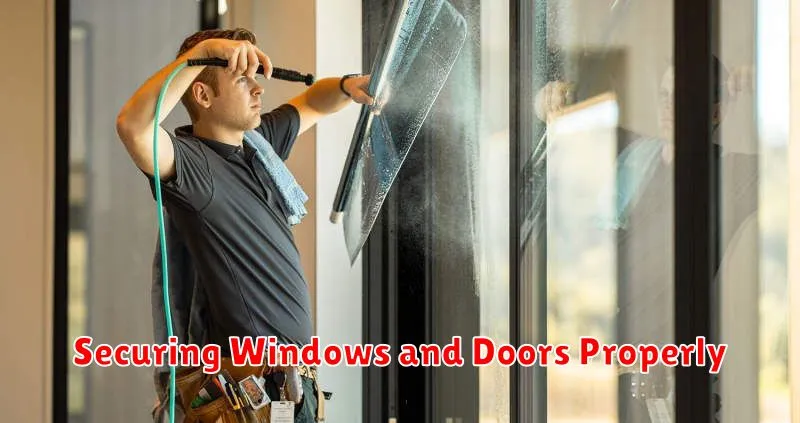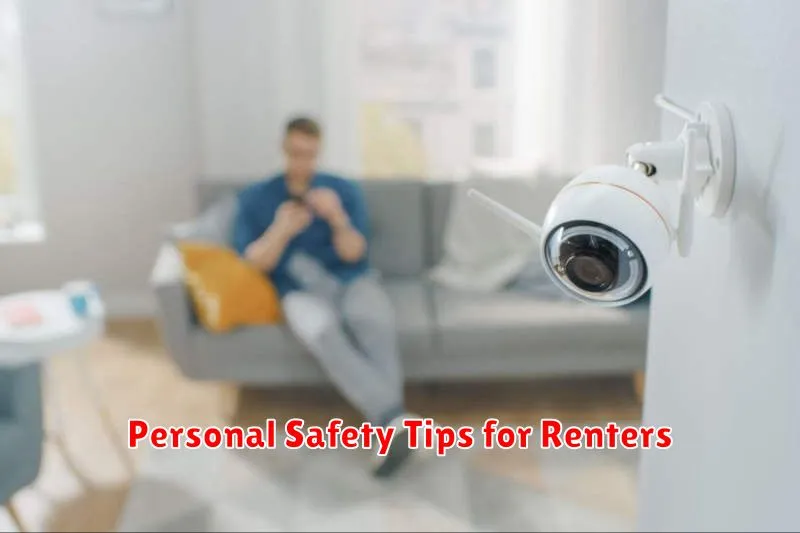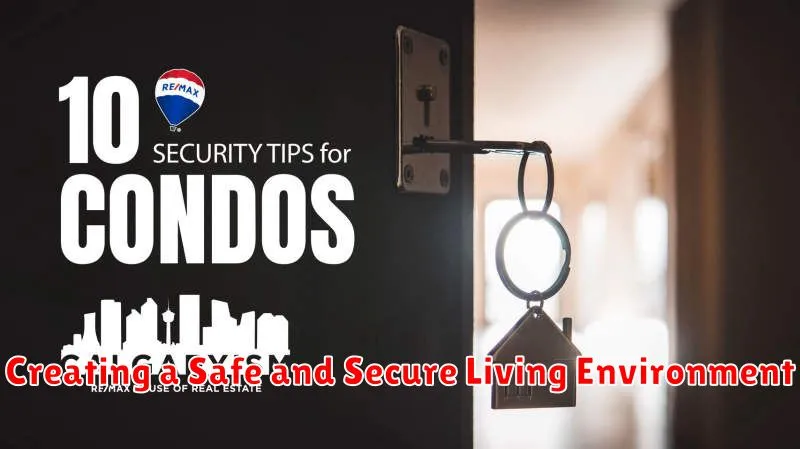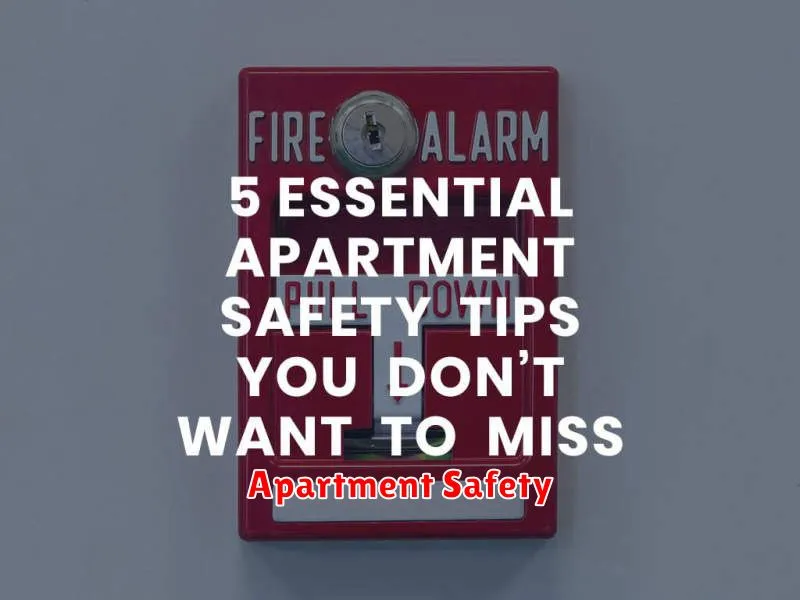Moving into a new apartment is exciting, but it’s crucial to prioritize safety. As a renter, you’re responsible for your own well-being and protecting your belongings. This article will provide you with essential apartment safety tips to ensure a secure living environment. From securing your doors and windows to being mindful of your surroundings, these practical steps will empower you to live confidently and peace of mind in your rental property.
Assessing Building Security and Safety Features
Before signing a lease, it’s crucial to evaluate the building’s security and safety features. This proactive approach can significantly enhance your safety and peace of mind. Here’s a checklist to guide your assessment:
Building Entry Points:
- Secure Entrances: Are the main entrances equipped with robust locks, security cameras, and intercom systems?
- Keycard Access: Does the building utilize keycard access for entry, restricting access to authorized residents?
- Well-Lit Entrances: Are the building entrances adequately illuminated to deter crime?
Safety Features:
- Fire Safety Equipment: Are fire alarms and sprinklers in working condition and regularly inspected? Are there clear fire escape routes designated?
- Emergency Exits: Are emergency exits easily accessible and clearly marked? Are there multiple exit routes available?
- First Aid Kits: Are first aid kits readily available in common areas and properly stocked?
Building Management:
- Security Personnel: Does the building employ security guards or have a security system in place?
- Maintenance and Response: Does the management promptly address maintenance issues and respond to security concerns?
- Communication: Does the building have a clear communication system for emergencies, including tenant notifications?
By diligently assessing these security and safety features, you can make a more informed decision about your apartment choice. Remember, prioritize your safety and well-being when selecting a place to call home.
Installing and Maintaining Smoke Detectors
Smoke detectors are essential safety devices that can save lives in the event of a fire. As a renter, you may not be able to install new smoke detectors, but you can still ensure that the ones in your apartment are working properly.
Check the existing detectors: Make sure that your apartment has working smoke detectors on every level and outside each sleeping area. Test them monthly by pressing the test button. If the alarm doesn’t sound, replace the batteries immediately or call your landlord to have the detector inspected.
Keep detectors clean: Dust and debris can interfere with the operation of a smoke detector. Vacuum or dust them regularly to keep them free of obstructions.
Replace detectors: Smoke detectors have a limited lifespan and should be replaced every 10 years. If you’re unsure when the detectors in your apartment were last replaced, ask your landlord.
Creating and Practicing an Escape Plan
Having a well-thought-out escape plan is crucial in case of an emergency. It’s essential to know multiple ways to exit your apartment quickly and safely, especially if you live on higher floors. Identify all possible exit routes, including stairs, fire escapes, and any other designated escape paths. Make sure you and your family members are familiar with these routes.
Practice your escape plan regularly. Conduct drills at least twice a year to ensure everyone knows what to do in the event of a fire or other emergency. Designate a safe meeting spot outside your apartment building where everyone can gather once they’ve evacuated. This will help ensure that no one is left behind in the chaos.
Keep escape routes clear. Make sure that hallways and stairwells are not cluttered with furniture or boxes. If you have a balcony or fire escape, ensure it is accessible and free of obstructions. You can also practice using a fire extinguisher and teach family members how to use it safely.
Securing Windows and Doors Properly

Your apartment’s windows and doors are the first line of defense against intruders. Make sure they are properly secured by following these tips:
Install Strong Locks: Ensure all doors have strong deadbolt locks and that they are installed correctly. Replace any weak or broken locks.
Use Security Bars or Chains: Consider installing security bars on sliding doors or windows, or using a security chain on your front door. This adds another layer of protection.
Keep Windows Closed and Locked: Even when you’re home, keep windows closed and locked, especially those on the ground floor or in areas easily accessible from outside.
Check for Gaps or Weak Points: Inspect windows and doors for any gaps, loose frames, or weak points that a burglar could exploit. Secure any gaps with weather stripping or caulk.
Keep Valuables Out of Sight: Don’t display expensive electronics or jewelry in plain view through windows. This could attract unwanted attention.
Light Your Property: Install motion-sensing outdoor lights to illuminate your property. Burglars are less likely to target well-lit areas.
By taking these steps, you can significantly reduce the risk of burglary and feel safer in your own home.
Protecting Yourself from Fire Hazards
Fires can happen anywhere, and apartments are no exception. While you can’t control everything, there are several things you can do to protect yourself and your belongings from fire hazards. Here are some essential tips:
1. Know Your Building’s Fire Escape Plan: Familiarize yourself with your building’s fire escape plan, including the location of fire alarms, exits, and assembly points. Practice the escape route with your family or roommates, and make sure everyone knows what to do in case of a fire.
2. Install Smoke Detectors: Ensure your apartment has working smoke detectors. If they are not already installed, ask your landlord to install them. You can also consider purchasing additional smoke detectors for your apartment, especially if you have multiple bedrooms.
3. Use Cooking Safety: Be mindful of cooking safety. Never leave cooking food unattended on the stovetop, and keep flammable materials like paper towels and curtains away from heat sources. If you’re using a grill or other outdoor cooking appliances, make sure they are at least 10 feet away from your building and any combustible materials.
4. Safe Use of Electrical Appliances: Be careful when using electrical appliances. Avoid overloading electrical outlets, and unplug appliances when you’re not using them. Inspect cords regularly for wear and tear and replace them as needed.
5. Avoid Using Candles: While candles can be decorative, they are a significant fire hazard. If you do use candles, always keep them in a sturdy holder and never leave them unattended. Make sure to keep them away from flammable materials.
6. Storage Safety: Avoid storing flammable liquids, such as gasoline, propane, or paint thinner, in your apartment. These items should be stored in a secure location outside of your residence.
By following these safety tips, you can minimize the risk of a fire in your apartment and keep yourself and your loved ones safe.
Electrical Safety Precautions in Your Apartment
As a renter, ensuring electrical safety in your apartment is crucial for your well-being and the well-being of those around you. Electrical malfunctions can lead to fires, shocks, and other hazards. Here are some essential electrical safety precautions to consider in your apartment:
Inspect Regularly: Regularly inspect electrical cords and appliances for signs of damage, such as fraying, cracks, or exposed wires. Replace any damaged items immediately.
Avoid Overloading Outlets: Overloading electrical outlets can lead to overheating and potential fire hazards. Avoid plugging multiple high-wattage appliances into the same outlet. Consider using power strips with built-in circuit breakers.
Use Ground Fault Circuit Interrupters (GFCIs): GFCIs are essential safety devices that can prevent electrical shocks. Install GFCIs in bathrooms, kitchens, and other areas where water is present. If your apartment doesn’t have GFCIs, contact your landlord to discuss installing them.
Keep Electrical Equipment Away from Water: Never use electrical appliances near water or with wet hands. Water can conduct electricity, increasing the risk of shocks.
Unplug Appliances When Not in Use: Unplug appliances when not in use to reduce the risk of electrical fires and save energy.
Keep Electrical Cords Away from Heat Sources: Avoid placing electrical cords under rugs or near heat sources, such as stoves or radiators. Heat can damage cords and increase the risk of fire.
Report Electrical Problems: If you notice any electrical problems in your apartment, such as flickering lights, sparks, or a burning smell, report them to your landlord immediately. Don’t attempt to fix electrical issues yourself.
Preventing Carbon Monoxide Poisoning
Carbon monoxide (CO) is a colorless, odorless, and tasteless gas that can be deadly. It’s produced by the incomplete burning of fuels like gas, oil, wood, and coal. In apartments, CO poisoning can occur from faulty appliances, blocked chimneys, or poor ventilation.
To prevent CO poisoning, install CO detectors in your apartment, especially near bedrooms. Test these detectors regularly and replace them according to the manufacturer’s instructions. It’s also crucial to ensure your appliances are properly maintained and vented.
Never use gas stoves or ovens for heating. Always keep vents and chimneys clear of obstructions. If you suspect a CO leak, immediately leave the building and call 911. Seek medical attention immediately if you experience symptoms of CO poisoning, including headache, dizziness, nausea, and fatigue.
Safeguarding Your Belongings from Theft
Living in an apartment can be a fantastic experience, but it’s important to be mindful of security. Unfortunately, theft is a real concern for renters, but there are steps you can take to minimize your risk and protect your belongings.
Lock Up Your Valuables: One of the most basic yet crucial safety tips is to always lock your apartment door when you leave, even for short periods. Consider investing in a high-quality deadbolt lock for added security. Also, keep valuable items like jewelry, electronics, and cash in a secure place, such as a safe or a lockbox.
Be Aware of Your Surroundings: Pay attention to who is coming and going from your building, especially late at night. If you notice any suspicious activity, report it to your landlord or building management immediately. It’s also wise to be cautious about who you let into your apartment.
Don’t Advertise Your Possessions: Avoid posting pictures of expensive possessions on social media. This information can be used by criminals to target your apartment. Be mindful of what you’re sharing online and be cautious about revealing too much information about your personal life.
Secure Your Windows: Windows are a common entry point for burglars, so make sure yours are secure. Invest in sturdy window locks and remember to lock them even when you’re home.
Don’t Leave Packages Unattended: If you’re expecting a delivery, arrange for a secure drop-off location or ask a neighbor to keep an eye out for it. Avoid leaving packages visible in your apartment hallway or on your doorstep.
Taking these steps will greatly reduce the risk of theft and help you enjoy your apartment experience with peace of mind.
Personal Safety Tips for Renters

Living in an apartment can be a great experience, but it’s important to prioritize your personal safety. Here are some tips to help you stay safe in your rental:
Be aware of your surroundings. When you’re walking around your building or neighborhood, pay attention to who’s around you. If you feel uncomfortable, trust your instincts and take a different route.
Don’t advertise your absence. Avoid posting on social media about when you’ll be gone. Keep your travel plans private, and consider setting timers on lights or having a neighbor collect your mail to make it seem like you’re home.
Secure your apartment. Use deadbolt locks on all doors, and make sure windows are closed and locked when you leave. Consider investing in a home security system or a door chain.
Be cautious about letting people into your apartment. If you’re expecting a visitor, be sure to confirm their identity before letting them in. If someone is trying to gain access to your building claiming to be a maintenance worker, contact your landlord or property manager to verify their identity.
Trust your gut. If something feels off, it probably is. Don’t be afraid to call for help or report suspicious activity to the police.
Communicate with your landlord. Let them know if you see any security issues or have concerns about your building. They have a vested interest in keeping tenants safe.
Emergency Preparedness for Natural Disasters
Living in an apartment can present unique challenges when it comes to disaster preparedness. However, with some planning and preparation, you can significantly increase your safety and well-being during a natural disaster.
Create an Emergency Kit: Pack a kit with essentials like water, non-perishable food, a first-aid kit, a flashlight, batteries, a whistle, a weather radio, and important documents. Consider adding a portable charger for your phone and any necessary medications.
Know Your Evacuation Route: Familiarize yourself with your building’s evacuation plan and the designated safe zones. Discuss with your neighbors and building management about meeting points in case of an emergency.
Secure Your Belongings: Anchor heavy furniture and secure objects that could be hazardous during an earthquake or strong winds. Consider using straps, bungee cords, or earthquake-resistant furniture brackets.
Communicate with Your Landlord: Inform your landlord about your emergency preparedness plans and any specific needs or concerns you have. This open communication can ensure you receive necessary assistance during a disaster.
Stay Informed: Subscribe to local weather alerts and emergency notifications from your city or county. Regularly check for updates and follow instructions from authorities.
Practice Regularly: Conduct drills with your family or roommates to practice your evacuation route and emergency procedures. This will help you react calmly and efficiently during a real event.
Reporting Safety Concerns to Your Landlord
Your safety is paramount, and your landlord is responsible for maintaining a safe and habitable living space. If you encounter any safety concerns within your apartment, it is crucial to inform your landlord promptly. Don’t hesitate to report issues such as faulty wiring, malfunctioning appliances, broken windows, or any other potential hazards.
To effectively report a safety concern, it’s best to do so in writing. This provides documentation and a record of the issue. Send an email or a letter outlining the specific problem, its location, and the date and time it was observed. Keep a copy of your communication for your records.
If the issue requires immediate attention, call your landlord and inform them of the problem. If you don’t receive a timely response or the problem persists, you can escalate the matter to your local housing authority or tenant’s rights organization. They can assist in resolving the issue and ensuring your safety.
Remember, your landlord is obligated to address safety concerns promptly and professionally. Don’t ignore any safety issues, as they can pose a serious risk to your well-being. By reporting concerns promptly and effectively, you are taking proactive steps towards creating a safe and secure living environment.
Understanding Your Tenant Rights and Responsibilities
Before we delve into apartment safety tips, it’s crucial to understand your rights and responsibilities as a tenant. Knowing your rights empowers you to ensure your safety and wellbeing within your rented space.
Tenant Rights: You have the right to a safe and habitable living environment. This includes basic amenities like working plumbing, heating, and electricity. You also have the right to privacy within your unit, reasonable notice before entry by your landlord, and protection from discrimination.
Tenant Responsibilities: As a tenant, you are obligated to pay rent on time, adhere to the lease agreement, and maintain the property in a reasonable condition. You are also responsible for informing your landlord about any maintenance issues promptly.
Understanding these rights and responsibilities is essential for fostering a positive landlord-tenant relationship and ensuring your safety within your apartment.
Creating a Safe and Secure Living Environment

Living in an apartment can be a great way to save money and live in a convenient location. However, it’s important to remember that apartments can be more vulnerable to security risks than single-family homes. This means taking extra precautions to ensure your safety and security is essential.
Here are some tips for creating a safe and secure living environment in your apartment:
- Install a reliable door chain and peephole. This will allow you to see who is at your door before opening it.
- Ensure all windows and doors are locked when you are away from home. You should also consider installing additional security measures such as deadbolt locks or window bars.
- Don’t leave valuables in plain sight. This can make your apartment a target for burglars.
- Invest in a home security system. This can include alarm systems, motion sensors, and security cameras. A home security system can deter criminals and provide you with peace of mind.
- Be aware of your surroundings. This includes being cautious about who you let into your building and avoiding walking alone at night.
- Get to know your neighbors. They can be a valuable resource in keeping your apartment safe. If you see anything suspicious, don’t hesitate to report it to the police.
- Make sure your apartment building is well-lit. Dark areas can attract criminals.
- Don’t share your personal information with strangers. This includes your address, phone number, and social security number.
- Be careful about what you post on social media. Sharing your location and activities can make your apartment a target for criminals.
- Report any suspicious activity to the landlord or building management. This includes damaged doors, broken windows, or unfamiliar individuals lurking around the building.
By taking these simple steps, you can create a safer and more secure living environment for yourself and your family.

